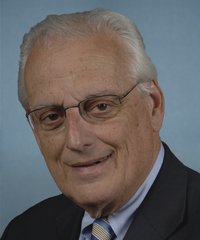
Congressman Bill Pascrell, Jr. has built a life of public service around the principles he learned while growing up on the south side of Paterson, New Jersey. The first member of his family to graduate high school, Congressman Pascrell went on to receive dual degrees from Fordham University, serve in the United States Army, and become a teacher and adjunct professor. He served as a State Assemblyman and Mayor of Paterson before his election to the United States Congress in 1996. In the Congress, Congressman Pascrell has prioritized funding public safety, supporting educators, protecting our environment, and making our tax system fairer. He now serves as Chairman of the Ways and Means Oversight Subcommittee, where he works tirelessly to improve our tax system for working families.
According to the Centers for Disease Control and Prevention, 2.5 million people sustain a traumatic brain injury (TBI) each year. There are an estimated 5.3 million Americans living with long-term disabilities as a result of brain injury and millions more are suffering from the residual effects of less severe TBIs. That is why I founded the Congressional Brain Injury Task Force in 2001. Co-chaired by Congressman Don Bacon (NE-02), the Task Force works to increase awareness of brain injury in the United States, supports research initiatives for rehabilitation and potential cures, and strives to address the effects such injuries have on families, children, education, and the workforce.
Each year, the Task Force hosts Brain Injury Awareness Day in March. This year’s briefing theme was “Living Well with Brain Injury” and we hosted experts from the Centers for Disease Control and Prevention, the Administration for Community Living, and experts who research and work in the brain injury field every day. At the annual Brain Injury Awareness Fair, organizations from all over the country that specialize in research, rehabilitation, and services for people with brain injury and their families display exhibits that help to educate Members of Congress and staff.
The Congressional Brain Injury Task Force recently hosted a briefing in June 2019 to highlight acquired brain injury and its impact on military and civilian populations. The briefing focused on injuries that cause damage to the brain by internal factors like lack of oxygen, exposure to toxins, or pressure from a tumor. In recent years we have made remarkable progress in increasing awareness and research of traumatic brain injury. Prevention has become more prevalent, diagnoses are being made earlier, and treatment is becoming better. However, we must continue to shine a light on acquired brain injury and work to overcome challenges.
The National Defense Authorization Act for Fiscal Year 2020 included language that I supported on blast exposure. Specifically, the measure ensures blast exposure history will be recorded in medical records of servicemembers, requiring the enclosure of critical details including the date and duration of the incident. The National Academy of Medicine has concluded that servicemembers with blast exposure history are at increased risk of long-term health issues including depression, Alzheimer’s-like symptoms, seizures, and problems with social functioning. Optimizing the readiness of servicemembers and recording blast exposure data is essential so that soldiers receive proper care for any service-connected medical issues that may arise later.
Brain Injury Association of America(Link)
Non-profitorganization dedicated to people with brain injury and their families. Offers research, education, and advocacy programs through a national office,networkof state affiliates, support groups, and a helpline.
U.S. Brain Injury Alliance(Link)
Non-profitorganization dedicated to people with brain injury and their families. Offers a network of state affiliates.
National Association of State Head Injury Administrators(Link)
NASHIA is a non-profit organization established to assiststategovernment in promoting partnerships and building systems to meet the needs of individuals with brain injury and their families. Since 1990, NASHIA has been the source of information and education for state agency employees who are responsible for public policies, programs, and services affecting individuals with traumatic brain injury and their families.
Defense and Veterans Brain Injury Center(Link)
The Defense and Veterans Brain Injury Center's mission is to serve active duty military, their dependents and veterans with traumatic brain injury (TBI) through state-of-the-art medical care, innovative clinical research initiatives, and educational programs.
BrainLine(Link)
BrainLine is a national multimedia project offering information and resources about preventing, treating, and living with TBI. BrainLine includes a series of webcasts, an electronic newsletter, and an extensive outreach campaign in partnership with national organizations concerned about traumatic brain injury.